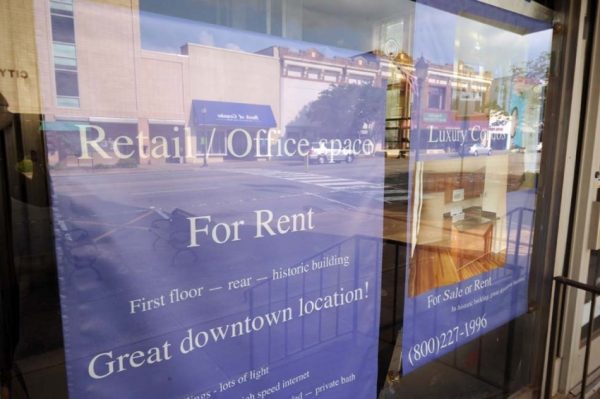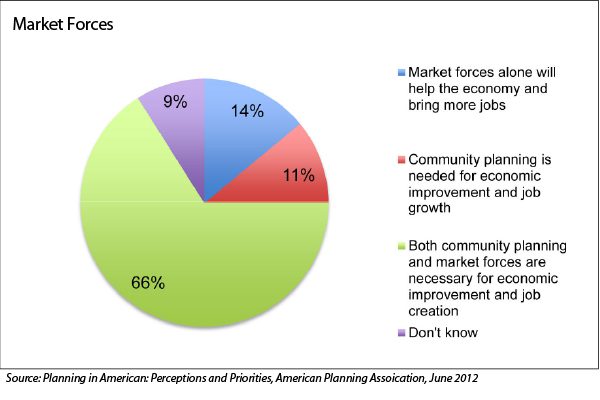Amid sustainability criticism, poll finds public prefers planning

Amid a political environment attacking global sustainability initiatives, a new national poll by the American Planning Association released Thursday finds bipartisan support for planning, as well as belief that community planners play a key role in economic recovery.
Some political groups have attacked planning and are crafting laws that would bar cooperative planning or ban the word “sustainability.” Results of the new poll show those efforts don’t reflect the primary concerns of U.S. residents, who are focused on jobs and the economy and believe a combination of market forces and planning – not the market alone, or planning alone – best support the economy.
|
Want to know more? To read more about the survey, including charts and graphics, click here to visit the APA’s site. |
“The results confirmed what we already believed: that it was a very vocal minority concerned about Agenda 21,” said Mitchell Silver, president of the American Planning Association and Raleigh’s chief planning and development officer.
“Agenda 21” is a voluntary global environmental initiative backed by President George H.W. Bush in 1992. Silver said the APA has spent time this year discussing the initiative and the opposition to it, because it has surfaced in political discussion. In North Carolina it has come up in the N.C. General Assembly and in the N.C. gubernatorial campaign, after GOP candidate Pat McCrory tweeted support for a resolution opposing Agenda 21.
The new poll results, though, will help the planning organization focus efforts on economic issues like jobs, Silver said.
The most important planning priorities for those surveyed? Jobs, safety, schools, neighborhoods and water quality, according to the poll.
“The public in general is speaking loud and clear: ‘We need you to help us plan for economic recovery,’ ” Silver said in an interview. The APA will use results to refocus its mission on those priorities, he said.
The poll surveyed 1,300 U.S. residents in March to help determine what the public wants from planners and what perceptions exist. Planners wanted a clear picture amid a squeeze on government budgets and vocal claims by those who see planning as part of a global conspiracy.
An example of a question on the issue of planning vs. “market forces” and the results (graphed) are below:
QUESTION:
Some people believe that community planning is a necessary part of improving the U.S. economy and encouraging job growth, while others believe that “market forces” alone will help the economy and bring more jobs. Which of the following statements comes closest to your belief?

Some state and local governments, including Gaston County, have adopted laws that criticize or outlaw any action seen to support Agenda 21. Those critics see the U.N. initiative at minimum as increasing government regulation and at maximum as a U.N. conspiracy to use planners to bring Marxism to the United States.
In the N.C. General Assembly, House Joint Resolution 983 calls on North Carolina to not comply with Agenda 21. In Alabama, a new law opposing Agenda 21 bans any local or state government entity from doing business with any organization linked to the initiative.
Amid that charged political environment, the new APA poll found bipartisan support for planning, and found a belief that planning can help tackle lingering economic challenges. Amid the poll’s other findings:
- Less than a third of respondents believe their communities are doing enough to address economic issues.
- Two thirds believe their communities need more planning and that it takes a combination of market forces and planning to help the economy create more jobs.
- Half of respondents want to be involved in community planning in the future.
- Almost half the respondents say living in their community is worse for most people than it was five years ago.
- Respondents describe ideal communities as having locally owned businesses nearby (55 percent); the ability to grow old in the same neighborhood (54 percent); availability of sidewalks (53 percent); energy-efficient homes (52 percent); and availability of transit (50 percent).
- Most respondents (85 percent) don’t know enough about Agenda 21 to hold an opinion; 6 percent oppose it and 9 percent support it.
The vocal Agenda 21 opponents weren’t the sole reason for the poll but were an important driver, said Jason Jordan, legislative director of the national planning organization.
“In many cases, it has proven to be enormously disruptive and confrontational,” he said. In addition, it had been 10 years since the organization last conducted a poll, he said, and given the economic and community changes, the group wanted to check in on attitudes toward planning. Planning, in and of itself, has also come under attack in some quarters.
The most surprising finding?
“We were very heartened at how broad-based the support for planning was across demographic groups and party affiliation,” Jordan said. Only 22 percent of Republicans surveyed believed market forces alone were enough to improve the economy and encourage job growth, while 14 percent of independents and 6 percent of Democrats believed market forces alone were enough.
“That runs directly counter to what we’re hearing from the critics,” Jordan said.
Silver echoed Jordan’s interpretation. “I was surprised at the level of support across demographic groups,” for planners, he said, as well as geographic groups in rural areas, small towns and big cities.
It was refreshing to see that when the poll asked specific questions about safety and schools, he said, people responded positively to planning.
“When you explain what planners do, people have a better reaction,” he said.
The survey has an error margin of plus or minus 3 percentage points. It was designed by Collective Strength in Austin, Texas, and reviewed and fielded by Harris Interactive.
For more on the survey, including charts and graphics, visit the APA’s site.